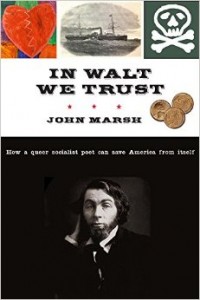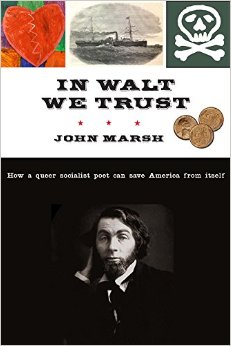 In Walt We Trust: How a Queer Socialist
In Walt We Trust: How a Queer Socialist
Poet Can Save America From Itself
by John Marsh
Monthly Review Press. 248 pages, $25.
JOHN MARSH proposes something here that may cause many readers to shake a skeptical head, but hear him out. In Walt We Trust addresses our generally fixed beliefs about death, money, sex, and democracy, and proposes that the writings of Walt Whitman can serve as a guide on the path toward human connection and personal fulfillment. And it’s surprisingly powerful stuff.
Beginning with death, Marsh allows the edges of his atheism to be contoured slightly by Whitman’s musings while riding the East River Ferry, where the poet notes that many of the things he observes will remain after he’s gone, and thus preserve an echo of experience. Marsh parses Whitman’s advice to “despise riches” and finds room for production and earnings within it, albeit tempered by an admonition against greed at the expense of one’s passions in life. Things truly take off, however, when Marsh writes about sex and democracy.
The discussion of sex is not initially promising. Marsh goes to a strip club to try to revel in the human form, as Whitman does so freely in his poetry. He’s too ashamed to make eye contact with the dancers, and the situation feels unnecessary and inorganic. Why not sit on a park bench and admire passers-by without staring? Marsh thankfully moves on to discuss Whitman’s sexuality. The question of whether he was gay or not still rankles critics, and In Walt We Trust breaks no new ground on the matter, though it does affirm that Whitman was “queer” as we use the term currently. Marsh notes that homosexuality as we understand it today was not on the radar in the mid-1800s; for example, none of Whitman’s work was ever banned for scenes extolling male beauty or sexuality. However, he goes on to cite passages from his private writings where the poet argues against his own closeness to a male friend, leaving us with the definitive “maybe” that sets up Marsh’s most powerful argument.
We live in a time of unprecedented access to explicit representations of sex, yet we’re also lonelier and more divided than were previous generations. Marsh describes in loving detail Whitman’s time caring for the wounded in makeshift Civil War hospitals: the young men hugged and kissed him, held his hand and wouldn’t let go. Yet these scenes carry no whiff of sexual desire. They’re merely evidence of a caring connection, and they may hold the key to rescuing our democracy, which Whitman viewed not as a political but as an intensely human institution. Writes Marsh: “It has much more to do with how you approach your fellow men and women. Do you respect them? Do you acknowledge their dignity? Do you identify your interests with theirs? In short, do you love them? Not all of them, of course, … but enough of them that everyone is included in the chain of affection, enough so that no one gets left out.” Were we to manage this humble feat, politics would probably have a lot less heavy lifting to do on our behalf.
Marsh writes with humor and humility. It was a series of personal setbacks that led him to pick up Whitman again after dismissing his relentless good cheer as shallow. He revels in a passage from “Song of Myself” in which a lonely woman watches young men bathing in a river, fantasizing that she’s among them: “All these details make the passage, to choose a literary critical term of art, hot.” Biographical sketches situate the reader in the poet’s world, largely changed in our time, but of which some crucial bits remain.
In Walt We Trust is an introduction to poetry, an argument for a robust, hands-on civility, a call to action, and (in the author’s words) a self-help book. To believe that we’re suffering from a collective national malaise implies belief in a cure; surely it can’t be more false promises about “too big to fail” or free Internet porn. This book proposes a different approach. It’s earthy and open-hearted, and most welcome.
_____________________________________________________
Heather Seggel is a peripatetic freelance writer based in northern California.






